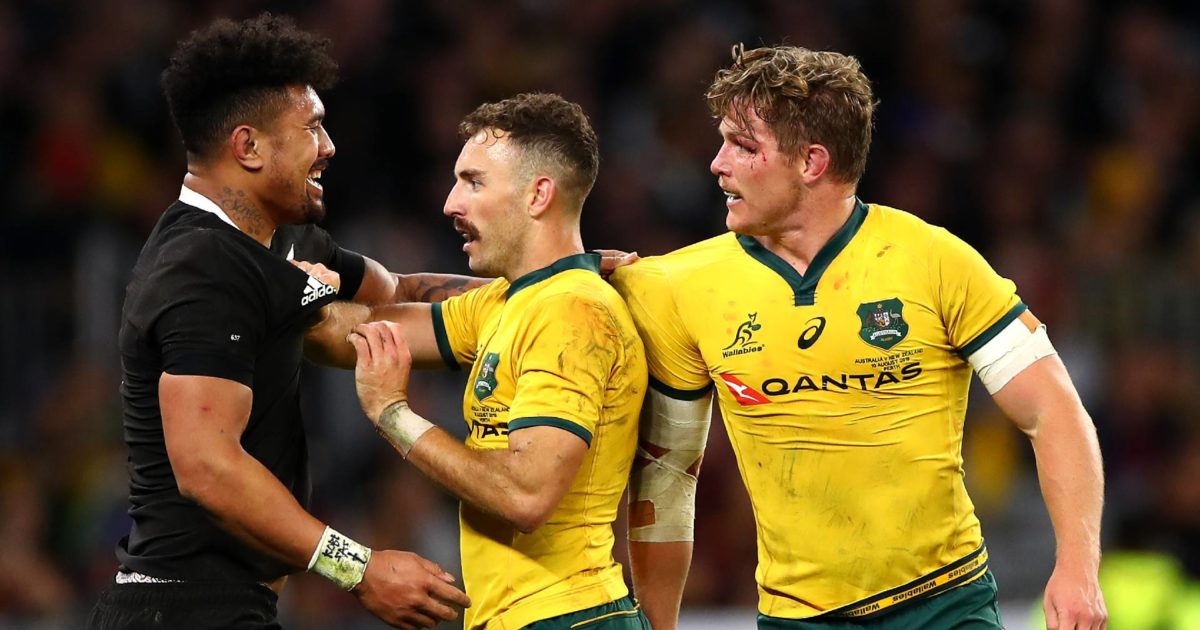Time for All Blacks to re-affirm their standing after disappointing 2019

A win, a draw and a loss doesn’t exactly make for great reading. That’s exactly how New Zealand’s 2019 Rugby Championship campaign finished, however.
It could’ve been so much worse, too. The All Blacks narrowly escaped with a four-point win in Argentina to kick off their campaign while a 74th minute Richie Mo’unga penalty kick back home in NZ ensured that Herschel Jantjies’ last-minute try for the Springboks didn’t consign the All to another loss.
Whatever the case, Ian Foster will be hoping for a much better result when his squad travels to Australia for this year’s iteration of the Rugby Championship.
First up, however, they’ll need to produce some emphatic wins over Australia in next month’s Bledisloe Cup matches.
Last year, the Wallabies embarrassed the All Blacks in Perth. The 47-26 drubbing marked Australia’s highest-ever score of their trans-Tasman rivals as well their biggest-equal winning margin.
Seven of the men that started for the Wallabies in that match aren’t a part of Dave Rennie’s 44-man squad. Kurtley Beale, Rory Arnold, Izack Rodda and Tolu Late have relocated to France while Samu Kerevi and Christian Lealiifano has taken his talents to Japan. Isi Naisarani, meanwhile, was simply overlooked by new coach Dave Rennie.
In contrast, just four of the defeated All Blacks from their starting team are absent from Foster’s first squad of the year. Ben Smith and Kieran Read have hung up their international boots while Owen Franks is in England and Scott Barrett – the man who was sent off 39 minutes into the defeat – is nursing an injury.
While the Wallabies’ absentees will likely be replaced by relatively untested newbies, NZ’s ever-apparent contingency plans could see the vacated spots filled by experienced options. Read’s absence will likely be the most significantly felt, with Ardie Savea, Sam Cane and Hoskins Sotutu all possibilities to wear the No 8 jersey.
Last year’s comprehensive defeat aside, New Zealand have had the wood over their neighbours in recent times, suffering just four defeats since 2010.
Rennie, who coached the Chiefs to two Super Rugby titles in 2012 and 2013, is well-aware of the history between the two nations and while he’s introduced a gluttony of young stars to the Wallabies, he’ll also be well aware that subjecting them to the All Blacks machine at this stage of their careers could reinforce the hoodoo that Australia simply doesn’t beat New Zealand – except on the odd occasion.
That puts the former NZ Under 20s coach in a difficult position. Man for man, are the experienced players in the Wallabies talented enough for Rennie to mould them into a team that can best the All Blacks? Or does he put his faith in the 20- and 21-year-olds in order to give his side that extra oomph?
The selection equation is probably not so difficult for Foster, who has a few key calls to make but will likely stick with largely the same side that lined up in last year’s Rugby World Cup semi-final.
If Michael Hooper is the captain then it goes without saying that Michael Hooper is the first-choice openside flanker. @TomVinicombe examines what that means for the rest of the @Wallabies loose forwards.https://t.co/DKKFFBnX6f
— RugbyPass (@RugbyPass) September 23, 2020
Foster will have a bit more freedom to experiment when the Rugby Championship arrives in November. If the All Blacks do take a 46-man squad to Australia, as is expected, then a slew of new and returning players could be set for minutes – especially if Argentina and South Africa don’t have access to their top talent.
Many of the Pumas players have been struck down by coronavirus while, over the weekend, South Africa’s Super Rugby sides played their first competitive matches since March.
Still, given the relative disharmony that existed amongst NZ fans when Foster was first appointed as coach ahead of Scott Robertson, last year’s assistant won’t want his charges to take their foot of the pedal.
This year is a time to re-affirm the All Blacks as the superpowers of world rugby, and that must start in October when the Wallabies come to town.











































